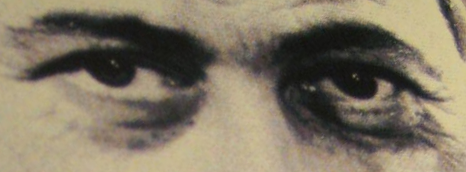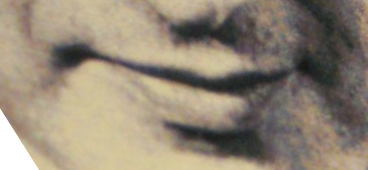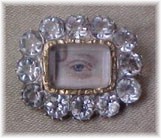
He looked like a black Thor, standing by the side of the crowd. He was surveying the periphery when I first saw him. I could tell he was someone official by the sticker on his – well, how can I describe it – it was kind of like what Thor would wear if he were a black man in the latter part of the twentieth century.
Even though he appeared to know many of the people in attendance, he kept an air of duty about him. He mingled, and said hello to all of the right people, yet he was official all of the time. He had power, he was definitely in control, and yet he was with the people.
I did not know him, yet I wanted to know about him. It was a large enough crowd that I felt I could probably observe him for some time without attracting attention, and so I did. Thor didn’t even seem to notice as he looked over the crowd as a shepherd might watch over his flock. I reflected upon the fact that there are very few black figures in the mythology of our childhood. Looking at Thor, I couldn’t see why. He cut an imposing yet majestic figure amidst the proceedings. He was a figure to look up to, to offer sacrifice to.
How could a god be in our midst, here in simple little Milwaukee, and why hadn’t we been notified of it in advance? When a film was being shot here we got day by day, blow by blow, accounts of it in the daily media. Yet here we had a deity walking amongst us, and, apparently, I was the only one who knew. Should I call the Action News Line 271-NEWS? Would they believe me? or would it be like Miracle on Thirty Fourth Street all over again? I felt somehow drawn to this Black Thor, to know his story, to understand how a black man could not only survive in Norse mythology but obviously thrive there to such an extent that he could be here and now, gracing the people of Milwaukee with his presence.
When I was a child, I read all of the great myths; Persious and Hermes, Titans and Hades, Loci and Mercury, Norse, Greek, Roman. They had fascinated me, they had taken a young boy’s mind and played freely upon his consciousness. While my contemporaries were out playing football or wrestling, I read Bullfinch’s and other collections. I imagined what the world must have been like when the gods called it their home, too. I always wondered where they had gone to, and why. I never subscribed to the Judeo-Christian mythology, and it’s perfect deities. I found the all too mortal gods of the Greeks and Norse to be much more believable. They were like us, like me, only better.
Only the Norse provided an explanation for their god’s disappearance. Loci, less than a god yet more than a man, had created a web of jealousy and suspicion. His callousness and self interest had caused the collapse of the entirety of the heavens. The gods had ended up retreating to Valhalla, leaving man to fend for himself in a world that had become too complicated for gods and goddesses to populate.
It was just one of many times in my life that I wanted to go back, to live the past for myself, rather than through a book. It’s a feeling similar to that which you get when you discover a dusty old box of post cards in the attic of your grandparent’s house and you see places or scenery that is vaguely familiar. As you look at the pictures, and read the faded inscriptions on the backs, you feel a longing. It is a longing that can transport your fantasy faster than any promise can.
Perhaps it is just because it is no promise, it is something you know cannot be, that you can so freely allow yourself to drift in the arms of dreams to find yourself in a distant past, whether it be upon the top of Mount Olympus or at the front of a wagon train heading west for the Oklahoma Purchase. The past is the most faithful of seducers, for it can’t mislead you, try as it might. If you believe in your own existence then you are safe.
So, when I was a child and my mother read me the works of H.G. Wells, it was not the Martians or the mutants that captured my imagination. It was the past. It was a time and place where the concept of such things as Martians and mutants was still so fresh. Perhaps the most seductive feature of the past is that it provides the most expansive frontier in which success is guaranteed. As a child, or as an adult, the future, while vast, holds as much chance of failure as of success. But the past … the past offers only success; discovery, invention, primacy and priority, notoriety and newness. As contradictory as it may sound, the past offers more opportunity for newness than the future, for it is always so difficult to fathom what is left to be new.
It was with these memories racing through my mind that I followed Thor. That I observed his actions and behaviors. I wanted to know what it was that a god would want to do upon our planet, our country, our town, in this day. Did he know that, according to his own mythology, he should be wintering in Valhalla, and summering in a galaxy far far away.
I remembered my own childhood again, when my mother read to me from the hallowed pages of H.G. It was The War of the Worlds, the Martians were encroaching upon all that was English and right. They were threatening the way of things. H.G., or, more properly, his character, was hiding in a coal bunker. Here was the literary vestige of one of the greatest writers of our era, hiding in a coal bunker, and that was where I wanted to be. I wanted to smell the coal dust, to feel the Martians near me, to try and think of a way to beat them, to bring the power of my wit the power of a 1920’s wit to bear upon the problem of the Martians and their occupation.
What was important here was not what was; myself an eleven year old kid, the story a fifty year old fable, the Martians an impossible foe. What was important was that I wanted to be the one who figured it out. I wanted to be the one who played the hero and saved the world, with a future that I didn’t already know.
Did Thor know the future? Did he understand how preposterous it was for him to be here? He was a god, after all, so I guess he must have. What is it like, I wondered to myself, to be a god from another era, another millennium, and walk amongst a people who do not even recognize you? It is said that Zeus used to change his form so that he could pass unnoticed amongst the common man, but surely that was not Thor’s situation, for I had easily picked him out in the crowd. And as for him being black, well we have only the dusty old books relating even dustier old legends to rely upon for our image of him. I can just imagine some mythologist, a few hundred years ago, saying to himself, “Hmmm, a black Norse God … Naaa, It’d never fly.” That’s how mythologies get written, anyhow.
I followed Thor as he walked slowly and majestically around the crowd, bowing his head slightly as a greeting to people who thought they knew him. I looked at the other people around me, to see if any of them had recognized him as I had. Alas, they had not. I was alone, it seemed, his only apostle, the only link between his past and my present.
I suddenly felt as though I possessed a great power, power over a god no less, for all that makes a god a god is the belief which we place in them. Take the Greek gods and goddesses, for example. Their downfall came not from any anti-god virus or excessive drink, no their fall from grace was the gradual decline in belief. If one is a god, then belief is your sustenance. The Greeks were usurped by a newer, younger god. When you’re a god, the old saying “Strength in Numbers,” has a different meaning; it is the number of believers that you are concerned about. The more gods you have, the more you fragment the available pool of belief.
As clear as I could tell, Thor had only one believer, me. Which put me in a position of extraordinary power. If I were to simply stop believing in him, he would cease to exist. All it would take was one capricious decision on my part and his godliness would come to a screeching halt. If I were to drink just a little too much, say, pass out, and awaken in the morning not remembering any of this evening’s events, he would be as good as gone.
I suddenly felt as though I no longer had to take responsibility for my actions. After all, I was a god’s protector. Yet I felt I had to take increased responsibility, as well, for he depended upon me. It is a difficult weight to carry upon one’s shoulders. What if I was to be hit by a bus? Would Thor take the same interest in my well being as I feel I must take in his? Does he, for that matter, even know that I am his believer? I had made no sacrifice or other homage. Quite the contrary, up ’til this point I had not even acknowledged my recognition of him. Should I now? Was that in my own best interest?
“Excuse me, Mr. Thor, I just wanted you to know, I believe in you. I’m the reason you’re here. Oh, and while we’re at it, could you please watch over me? It’s for your own good, you know. Remember what happened to the Greeks (nudge nudge).” I think not. One doesn’t just walk up to a god and say these things, does one. Besides, this is Thor, the God of Thunder. If he wanted, he could have me for supper. Even if it would mean his extinction, he might think it was worth it. How often, throughout history, have we read of men who would give their lives to kill a God? Was this any different? For, in a sense, I was Thor’s God. He depended upon me, he needed me, I held infinite power over him. And, from the looks of things, he couldn’t have cared less.
I don’t think he even noticed me as I tailed him about the area. At one point he suddenly turned and almost ran me over. His eyes never even looked. I watched his face, looking for some sign of recognition. There was none. I was showing him some degree of respect, the least he could do is return the favor. I guess that’s a lot to ask from a God, though, isn’t it.
Things continued along these lines for quite some time: Thor, being Godly, and I, following him and contemplating all of the ramifications. The festival wound its way into the night, and we each had food and drink a’plenty. I fancied that we were at some truly Dionysian event, which, had we been in the proper time, would have been attended to by lovely maidens dropping peeled grapes into our mouths as we guffawed over the antics of mortal men and toasted each other for our power.
Would I have sat at Thor’s right hand? or he at mine? I wondered. Who is truly the greater, the believer or the believed? Where, for example, would Jesus have been, was it not for his apostles? Without anyone to tell of his power and greatness, he would be just another dead Jew. Or even, for that matter, Santa Claus. In Miracle on Thirty Fourth Street, doesn’t Kris Kringle say that for as long as a single child believes in him he shall continue to exist?
As I approached the beverage tent to order another drink I was beginning to feel rather emboldened by the current state of affairs. I tipped the bartender a few dollars I could afford it, I knew a God. All this time I kept my eye on Thor. He stood nearby me now, enjoying the festival as much as I was. I was proud of the fact that, up ’til now at least, I was going drink for drink with a God. How many people can say that? I will admit I was feeling a little light headed, but nothing too bad. Thor, on the other hand, was getting down right happy.
I guess it’s only appropriate that a God should be a happy drunk. I mean really, what does he have to worry about. My health, of course, he has to worry about my health. Without me, he’s nothing. It was rather remarkable that, considering the circumstances, he had done nothing to enlist any more believers. I think, were I in his shoes, I would at least have given it a token effort, but he had not.
As I watched, Thor turned, and, for the first time, his eyes met mine. It was as if I was looking into a bottomless well of humanity and compassion, of age and faith, of hope and inspiration. I was overwhelmed by this, and averted my gaze. I looked up again, in time to see him drop his empty cup into the garbage, and walk around the side of the tent. Regaining my composure, I no longer thought of power or compromise. I just believed, unconditionally.
I quickly ordered myself another drink, and one for Thor. I’ll just walk up and give it to him, I thought, and quietly walk away. Maybe I’ll just kind of look him in the eye and say “I believe.” Or, if he’s interested, a short theological discussion might be in order. I took the drinks from the bar, and proceeded to follow Thor’s trail.
As I rounded the corner of the tent, I heard a faint hacking sound, and a muffled moan. There, crouched next to the canvas, was Thor, a pool of vomit at his feet. Here was Thor, a God among men, with a pool of vomit at his feet. I slowly walked ’til I stood above him. I pulled myself up to my full height, held the drink out before me, and said “I believe, I truly believe.”
Thor looked up from his own morass and stared at me long and hard. As I met his gaze, I felt that same overwhelming impression as I had previously, that same compassion for mankind. He raised his hand to mine and took the drink from me. He looked at the drink, and then, again, at me. He wiped his mouth, took a sip, and said “So do I.”








